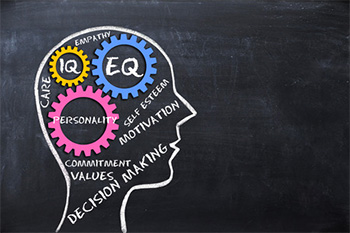One of the hardest tasks a business owner will face is hiring the right set of employees. You'll screen many candidates, each with their own unique potentials and accomplishments.
But to really make sure you're hiring the best of the best, you'll need to take IQ and EQ into account.
While a stacked resume is helpful, you must trust this person to get the job done in an effective manner. [quotes]Likewise, sometimes it's more important to have quality people skills for a task.[/quotes]
So, which is more important in the battle of IQ vs EQ? Read on to find out the pros of both and see which shows stronger potential.
What to Know About IQ
IQ, short for intelligence quotient, was coined by German psychologist William Stern. In 1912, Stern's book, The Psychological Methods of Testing Intelligence, featured an aptitude test. This was the first known instance of an IQ test.
Stern's methods for determining intelligence were a bit lackluster at best. For instance, the test taker's age was taken into account, including year and months.
If you've taken any IQ test – online or otherwise – you know that age has little to do with anything. These days, IQ is determined in a different way. Current tests include shorter, more practical tests like memorization and spatial recognition.
Depending on the test taken, you may also have to answer some basic math questions. [quotesright]However, IQ tests tend to focus primarily on cognitive ability and logical reasoning.[/quotesright]
Test scores range from slightly below 70 to slightly above 140. The average IQ rests somewhere between 90-110. As you can imagine, businesses like to hire those with higher IQs because of their superior reasoning skills. [quotes]You can expect a candidate with a high IQ to excel at tasks like data analysis or financing.[/quotes]
What to Know About EQ
In contrast, EQ, or emotional quotient is all about one's ability to empathize and emote. Think of it as the more humanistic side to IQ's focus on base intellect. EQ is also substantially harder to gauge, as it's a newer concept created in 1985.
While there isn't a standardized test like with IQ, you can take a personality test to determine EQ. At its core, EQ determines the baseline at which a person is able to adapt to their environment. Instead of logic, it focuses on empathy and one's ability to emote effectively.
 There are a few factors that come into play with EQ, including:
There are a few factors that come into play with EQ, including:
- The ability to control one's urges.
- The ability to maintain relationships with others.
- Self-awareness, including strengths and weaknesses.
- Stress management.
[quotes]EQ is also quite different from IQ, as it relies almost solely on how one is able to work with others.[/quotes] Since it focuses only on emotion, feats like understanding the feelings of others play a significant role.
Those with a high EQ are great for jobs in a team environment, as they thrive on the energy of others. Teamwork also requires a great deal of intuition.
[quotesright]A quick note: Since people are complex beings, it's likely to be proficient in both. [/quotesright] The strongest candidates are ones that show a strong aptitude for both logic and emotion.
Types of Jobs For Those With High IQ
As you can expect, a candidate with a high IQ is a fantastic asset to have on your team. They're great with data, numbers, and anything that deals with cold, hard facts.
While they may not be as creative as their EQ-heavy coworkers, they're still important. You can expect accuracy, clarity, and data-driven results.
One of the best things about candidates with a high IQ is their determination. [quotesright]Since IQ is based on reasoning, you can expect them to be excellent problem solvers.[/quotesright] In fact, IQ is such an important factor that many job interviews now involve problem-solving tests. An interviewee may be asked, for instance, to follow a simple pattern and repeat it back.
Here are a few of the most popular professions for those with a high IQ:
- Doctor
- Scientist
- Professional academic
- Engineer
- Electrician
- Lawyer of paralegal assistant
- Judge
[quotesright]In the IQ vs EQ battle, those with a high IQ tend to prefer working on their own. [/quotesright]
Types of Jobs For Those With High EQ
In contrast, many businesses prioritize those with a high EQ. While intelligence is certainly an important component, [quotes]a great employee needs to know how to work with others.[/quotes]
Those with a higher emotional intelligence flourish when they're surrounded by others. Have you ever been at a party where a guest just feeds off the energy of the other party-goers? It works in much the same way in a work environment, too.
Your HR department, for instance, is a great place to put those who excel at relating to the emotions of others. An employee will have to navigate relationships and tensions. Having someone on hand who knows how to diffuse tension is a great tool.
Here are a few other great jobs for those with a high emotional intelligence level:
- Teacher
- Nurse
- Government employee
- Counsellor
- Manager
- Team leader
- Receptionist
- Public spokesperson
- Hiring manager
Which Is More Valuable? IQ vs EQ in Real World Situations
Now comes the all-important question, [quotes]which candidate should you focus on?[/quotes] The candidate with higher traditional intelligence, or the candidate with stronger personal skills? The answer ultimately changes depending on the situation at hand.
- If the candidate will deal with team members and fellow employees, you'd want a candidate with a high EQ.
- If you're looking to fill a position that requires precision and numbers, book smarts may be your best bet.
[quotesright]Competency can largely be taught, but people skills require a bit more intuition. [/quotesright]
Largely, the choice is up to you as a business owner. The perfect team needs to be a mixture of those with both types of intelligence. The stronger and more diverse a team's skill set is, the stronger your business will be.
When filling a position, ask yourself: what does the job require? IQ vs EQ may seem like a no-brainer at first, but interpersonal skills are a must for nearly any job.
For more great tips on how to run your small business, be sure to sign up for your free FocalPoint newsletter!








